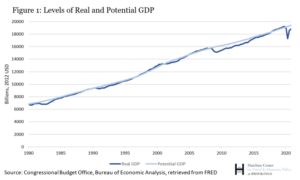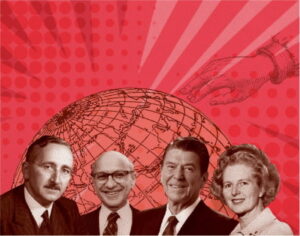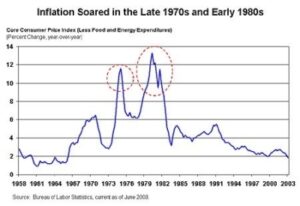Dr. Stephanie Kelton is a professor of economics and public policy at Stony Brook University. She is the author of the bestseller The Deficit Myth in which she explains the Modern Monetary Theory macroeconomic lens for analyzing what money is and how it works.
This blog post is a summary (not a word-for-word transcript) of an interview she gave at the University of Adelaide in Australia while she was there in January of 2020 to deliver the 2020 Geoff Harcourt Visiting Professor lecture.
She was interviewed (mostly about Modern Monetary Theory) by economics student Coco Hoskin-Murray.
Table of Contents
Advise for girls thinking of studying economics?
This was the first question. Professor Kelton answered that females who wish to study economics should do it, should not be intimated, that in the courses she teaches her top students tend to be female, and that there are employers wanting to hire smart economists, without regard to gender.
What is Modern Monetary Theory?
The interviewer said she was lucky to be able to study economics in high school, but she was taught only neoclassical economics, which Modern Monetary Theory is not. So she asked Professory Kelton to explain what MMT is.
Professor Kelton emphasized the importance of a diversity of ideas in the classroom and in the field of economics.
She stated that while it’s not uncommon for high school economics to use one textbook, have one teacher, and teach one way, that when you get to University you hopefully have exposure to different professors who have different ways of thinking about economics.
People from different schools of thought ask and answer questions differently.
With Modern Monetary Theory, they ask different questions and much of the time what matters most is not getting different answers, but rather in the asking of different questions.
One of the questions Modern Monetary Theory asks is how should we think about governments that operate with a currency that they issue themselves?
And how does that change the way we think about public finance, the limits on government spending, fiscal policy, macroeconomic stabilization, etc.
It opens up a whole bunch of additional questions, but understanding history is necessary for understanding economics, such as in that 1971 something really big happened in the way we changed the international monetary system.
And this change in the monetary system changed the way we do economics.
Since MMT is a framework and not a policy, what are the policy implications of MMT?
The biggest one is that if you are a government that operates with a sovereign currency, which Australia does (the Australian dollar) since the government is the issuer of the Australian dollar, the government does not need to run its budget the way that people, households, private businesses, and more localized (currency user) governments do.
There is a big difference between being a user of the currency and being the issuer of the currency.
So the limits are different. If you are able to issue your own currency, then you don’t face the same kinds of constraints that households face.
You won’t have a revenue constraint. You don’t face financial constraints.
There are limits, and the limits are what is really important.
There are real limits to how much a government can safely spend, how it can operate its budget, but most of the time, what we discover is in spite of currency-issuing governments having more fiscal “firepower”, are often too afraid to run their policies in the maximum interests of benefitting the economy because they worry about things like budget deficits, and the national debt and this is mostly because they are failing to understand the nature of the monetary system.
So we use economies to balance budgets rather than use budgets to balance economies?
Yes, we operate chronically below our potential.
You often hear politicians talk about governments living within their means. Well, we live well below our means, as a nation.
We’re not operating at our maximum efficiency and that means that there’s waste involved which is burdensome to the economy as a whole.
What we want to do is try to get our policymakers and other economists to start thinking about what’s important.
What’s important are the real outcomes, the human outcomes. Not the budget outcomes.
Until we get that right, we’re going to continue to set the wrong targets. We’re going to focus on trying to balance the government’s budget.
And how do we do that?
To put the government’s budget in balance we need to cut spending, raise taxes, and those things can actually work against you.
So you end up with a worse economy because you’re fiddling around trying to force the government budget into balance to get a very unbalanced economy, for the purpose of trying to balance the budget.
Modern Monetary Theory tries to get us to focus on the right things, the real outcomes that matter.
The budget outcome isn’t what’s important. You can use the budget to deliver a good economy.
That’s not a common view – where did MMT enter your life?
When Professor Kelton was a graduate student at Cambridge University.
It wasn’t called Modern Monetary Theory back then.
It was a man in the finance community who was an investor who had written a little booklet and who was thinking about things in a very different way.
Probably because he didn’t have the economics training he hadn’t been taught to think in one way.
He dealt with financial markets so he was accustomed to thinking in terms of monetary operations.
His name is Warren Mosler.
When she first started reading Warren Mosler’s work it seemed completely backwards. She thought he was completely wrong.
But she started reading, and asking questions, and talking to people at the Treasury and at the Federal Reserve, and she started connecting the dots and what she learned about the monetary operations at the treasury and at the federal reserve convinced her that this guy who had been working in financial markets for a long time might know a little bit more than she did as a graduate student, and it changed her thinking.



